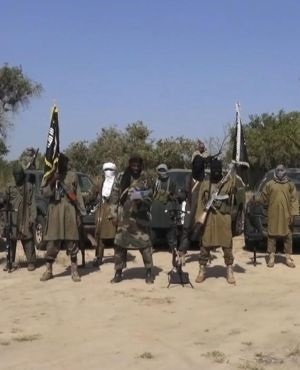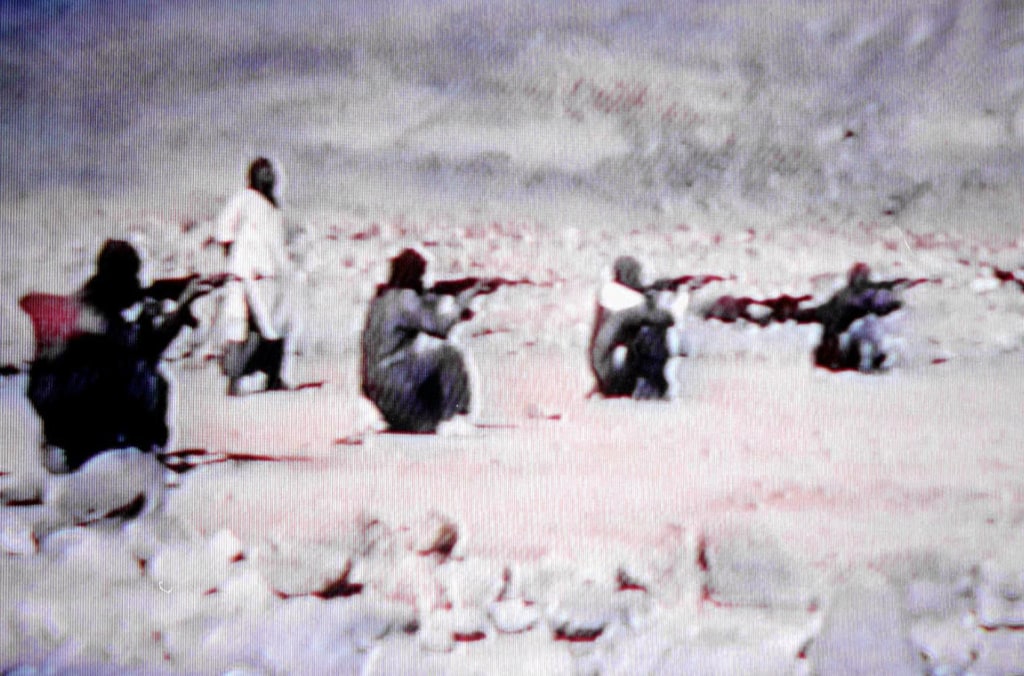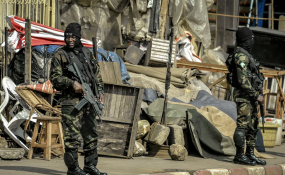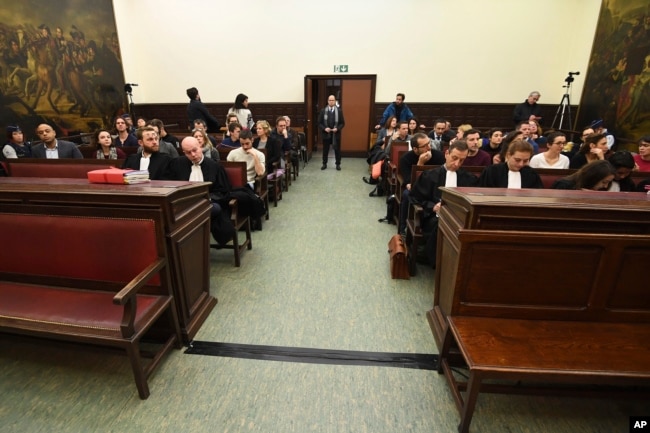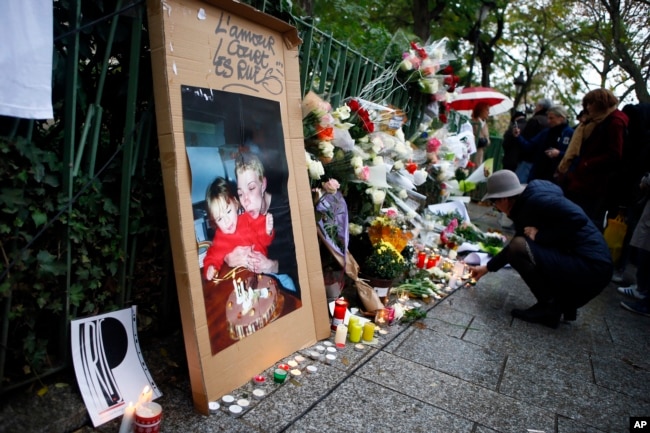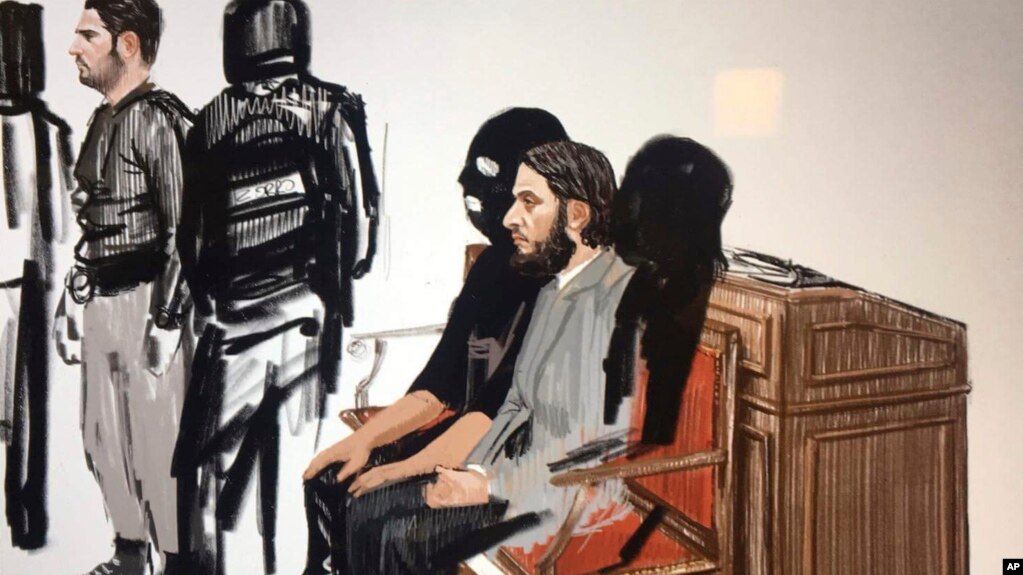 In this courtroom sketch, Salah Abdeslam, right, and Soufiane Ayari, left, appear at the Brussels Justice Palace in Brussels on Monday, Feb. 5, 2018.
In this courtroom sketch, Salah Abdeslam, right, and Soufiane Ayari, left, appear at the Brussels Justice Palace in Brussels on Monday, Feb. 5, 2018.
PARIS —
The first trial against top surviving Paris attacks suspect Salah Abdeslam opened in Brussels Monday amid tight security and a packed courtroom.
A bearded Abdeslam, 28, appeared clad in a white sweater and unshackled -- surrounded by hooded security guards dressed entirely in black, according to reports of journalists present in the courtroom. He refused to rise when the judge asked him to, or to identify himself. Fellow accused, Tunisian-born Sofien Ayari, 24, was also present.
He also declined to answer questions.
"I defend myself by keeping silent," he said.
The four-day trial will not deal directly with the November 2015 attacks that killed 130 people around Paris, in which Abdeslam is believed to be the sole surviving participant, but rather with a March shootout with police when he was on the run. But it is being closely watched, in hopes it may shed insight into the tangle of alliances and events that link the Paris attacks with the March 2016 attacks on the Brussels airport and metro.
"Will he say anything more than he has said?" asks Rik Coolsaet, a longtime terrorism expert and senior fellow at the Egmont Institute, a Brussels-based research group. "If he doesn't, I'm afraid the trial will not make things much clearer about his involvement either in the Brussels or in the November attacks in Paris."
Both Abdeslam and Ayari face attempted murder charges in connection with the March 16 shootout that occurred days before Abdeslam was captured after months on the run — and days before the terrorist attacks in Brussels.
Much still unknown
Abdeslam’s trial comes amid a changing terror landscape in Europe. With the Islamist State group beaten back in Syria and Iraq, the focus is now on returning radicals and those leaving European prisons in the not-too-distant future. The Brussels trial is one of many expected during the coming months and years dealing with recent terrorist attacks across the region.
But while the trials may shed light on the past, "they won't inform us much about the future threats and challenges," analyst Coolsaet says. "We are living in a kind of post-ISIS era, in which the threat has been transformed from organized networks of plots and attacks to lone actors."
A former pot-smoking petty criminal who once ran a bar in the Molenbeek neighborhood of Brussels with his brother Brahim, who blew himself up in the Paris attacks, Abdeslam seems an unlikely jihadist. His Belgian lawyer, Sven Mary, once characterized him as a ‘little jerk from Molenbeek’ with the "intelligence of an empty ashtray."
Yet Abdeslam is believed to have played a key logistical role in preparing the attacks. He allegedly organized safe houses, drove across Europe to pick up other suspects, and dropped off three suicide bombers at the Stade de France soccer stadium outside Paris, where they blew themselves up during a France-Germany game.
The stadium attack was the first in a string of shootings and bombings that took place across Paris on a warm November evening. The terrorists targeted bars, restaurants and the Bataclan concert hall before blowing themselves up or being shot dead by police.
But Abdeslam escaped, sneaking across the French border into Belgium the following day with the help of friends. Recent evidence shows his suicide vest was defective, although it remains unclear whether he intended to trigger it.
After a four-month manhunt, he was finally caught in the Molenbeek neighborhood where he grew up, shortly after the shootout with police, who were investigating a suspected safe house they originally thought was unoccupied.
Days later, three bomb attacks on Brussels airport and the Maalbeek metro station killed 32 people. The suspected killers were closely tied to the Paris attackers. Abdeslam, who initially talked during interrogations, and gave misleading information, has kept silent since.
His silence ultimately led both Belgian lawyer Mary and Abdeslam’s French lawyer Franck Berton to give up his defense a few months later. Berton blamed the round-the-clock surveillance for eroding Abdeslam’s mental stability, and warned his former client was "radicalizing in an extreme fashion." In December, Abdeslam finally tapped Mary to resume his defense for the Brussels trial.
Many questions remain about the Brussels and Paris attacks, among them the whereabouts of onetime Syrian jihadist and suspected coordinator Oussama Atar. An international arrest warrant is still out for Atar who, like Abdeslam, is a Belgian national of Moroccan extraction (although Atar is bi-national). He is also the cousin of two of the Brussels suicide bombers.
The French and Belgian attacks were only the beginning of several killings across Europe that targeted Germany, Britain, Spain and the French Riviera city of Nice. Last month, the first trial relating to the 2015 Paris attacks opened in the French capital. Three suspects are charged with assisting or being aware of the assailants’ whereabouts.
Changing threat
But the geopolitical landscape has changed dramatically in the interim. With IS weakened, terrorists in Europe cannot count on the same kind of extensive backing as the Paris and Brussels assailants once had, analysts say.
European jihadists are also coming home, although in fewer numbers than earlier feared. "Returnees are not coming back here en masse, and that’s for the whole of Europe," says terrorist expert Coolsaet. "Either they're fighting to death, or they're being imprisoned."
Yet other threats remain. That includes in overcrowded prisons which critics claim have long been breeding grounds for terrorists.
For survivors and victims’ families, the Paris attacks remain painfully present. Jean-Francois Mondeguer lost his daughter Lamia, killed in a hail of gunfire as she was dining with her boyfriend at an outdoor cafe. Mondeguer is part of a survivors’ group called "November 13, Brotherhood and Truth."
Before leaving for Brussels to attend Abdeslam’s trial, Mondeguer said, "I'm not angry with him, I don’t hate him, but I will never forgive him. What we want to find out is what exactly happened on November 13."


